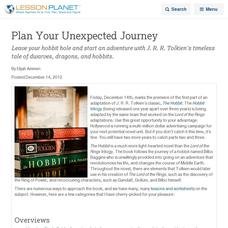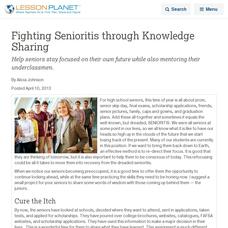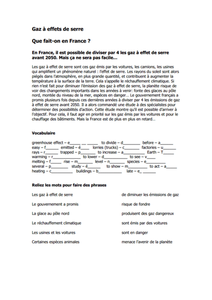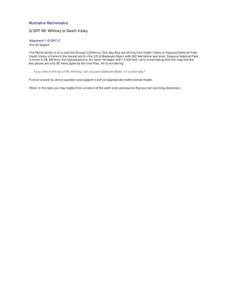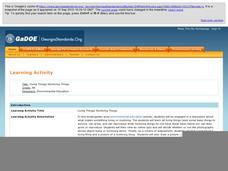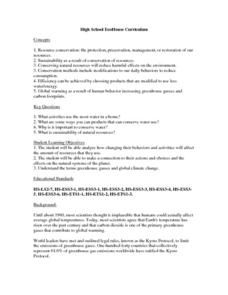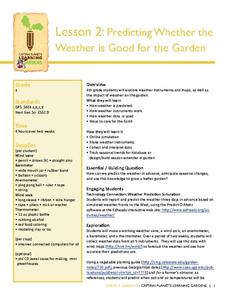Curated OER
Reading Comprehension: Voice of Nature
Understanding a text can be a very interesting task. Fourth graders read a passage describing the origin of an Aboriginal myth. They answer 11 comprehension questions that require them to pull key details, use context, and think...
Curated OER
Engaging Young Scientists with Inquiry: Part Two
Evaluating data and learning to communicate the results is a big piece of the inquiry puzzle.
Curated OER
Plan Your Unexpected Journey
Leave your hobbit hole and start an adventure with J. R. R. Tolkien's timeless tale of dwarves, dragons, and hobbits.
Curated OER
Fighting Senioritis through Knowledge Sharing
Help seniors stay focused on their own future while also mentoring their underclassmen.
Curated OER
Celebrate Endangered Species Day at Your School
Learn how your school can join numerous conservation organizations in celebrating Endangered Species Day on May 17th.
Curated OER
Gaz a effets de serre
How are emissions currently affecting the environment in France? Advanced French learners read a paragraph detailing the greenhouse effect in France and what the next steps are. Five short exercises follow the passage focusing primarily...
Indian Land Tenure Foundation
Tribal Origin Stories
The teacher reads and retells Californian tribal origin or creation stories that come from the traditions of a variety of California Indian tribes. Then, pupils get together in groups and retell the stories they just heard; just as the...
Curated OER
Mt. Whitney to Death Valley
This is an intriguing problem that brings together real-world data, technology, and mathematical problem solving. If visibility wasn't an issue, could you see from the highest point in the lower 48 states, Mt. Whitney, to the lowest...
Curated OER
Take Your Class to the Moon
Get your kids talking about our lunar neighbor with these hands-on lessons.
Illustrative Mathematics
Pennies to Heaven
Even though pennies seem to be relatively thin, stack enough of them into a single stack, and you could have quite a high stack. Enough so, that the final result can be a surprise to you as well as your class. This activity centers...
Georgia Department of Education
Living Things/ Nonliving Things
How can you tell if something is living or nonliving? Introduce a set of criteria which can be used to determine which things are alive and which are not. The class discusses the basic needs of all living organisms, checks out an...
California Academy of Science
Global Climate Change and Sea Level Rise
Ice is nice, and its condition on the planet has a significant effect. Junior geoscientists experiment with ice melting in both water and on land to discover how each affect the rising sea level. This detailed lesson outline even...
California Academy of Science
Human Evolution
As the great and hilarious Tim Minchin once said, "Science is simply the word we use to describe a method of organizing our curiosity." Science is more than just a guess; it is based on questions, observations, and evidence. High...
Curated OER
High School EcoHouse Curriculum
How has the level of carbon dioxide changed over recent years, and what is contributing it? Groups work together to research and present their findings in a creative way. Also built into the lesson is a visit to a sustainable house, but...
NASA
Soda Straw Rockets
Three, two, one, blast off to a better understanding of force and motion with this exciting science lesson! Beginning with a discussion about rockets and gravity, young scientists go on to complete a series of worksheets about net forces...
Captain Planet Foundation
Rotting Away
What happens at the end of a plant's life cycle? Show kids the natural way that plants show that they're decomposing, as well as the importance of compost, with a lesson about living organisms. After reading Log Cabin by Anne Schreiber,...
We are Teachers
NGSS Explained
Here is a very attractive and well-designed infographic explaining the Next Generation Science Standards (NGSS).
Humanities Texas
Primary Source Worksheet: Abraham Lincoln, Draft of the Gettysburg Address
Young historians closely examine the words of Abraham Lincoln's Gettysburg Address with this primary source analysis worksheet.
Captain Planet Foundation
P is for Poppies
Explore the way local farming and rationing helped the war effort in World War I with a lesson plan on gardening. After learning about trench warfare, reading "In Flanders' Field" by John McCrae, and studying poppies, kids discuss the...
Captain Planet Foundation
Shape Shifters in the Math Garden
Combines mathematical measurement with gardening skills. Third graders hunt for worms in the garden and try to find the longest one. They also measure and weigh vegetables that they harvest from the garden, measure rainfall amounts, and...
Captain Planet Foundation
Energy Flow in the Garden
How can you tell what an owl has eaten? Study the food chain and flow of energy in an ecosystem by dissecting an owl pellet and noting the bones found inside. Additionally, the lesson plan includes a game about consumers and producers...
Captain Planet Foundation
Worm Your Way Out of This
How can you provide healthy soil for your garden? Study worms, bacteria, and other microorganisms in a lesson about decomposition and organic compost. After discussing what you know about worms and watching a video, watch what worms do...
Captain Planet Foundation
Which Plant Is Which?
Learn about dichotomous keys, plant identification, and how to care for the planet with a lesson that includes several hands-on and innovative activities. Kids go on a plant scavenger hunt and classify the plants that they find...
Captain Planet Foundation
Predicting Whether the Weather is Good for the Garden
Can your class predict the weather? Show them how they can come close with a lesson about creating weather instruments, including weather vanes, barometers, wind socks, anemometers, and thermometers. Kids research weather patterns and...




